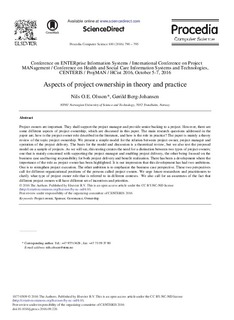| dc.contributor.author | Olsson, Nils | |
| dc.contributor.author | Berg-Johansen, Gørild Elisabeth | |
| dc.date.accessioned | 2016-10-06T16:45:52Z | |
| dc.date.accessioned | 2016-10-10T07:50:30Z | |
| dc.date.available | 2016-10-06T16:45:52Z | |
| dc.date.available | 2016-10-10T07:50:30Z | |
| dc.date.issued | 2016 | |
| dc.identifier.citation | Procedia Computer Science 2016, 100:790-795 | nb_NO |
| dc.identifier.issn | 1877-0509 | |
| dc.identifier.uri | http://hdl.handle.net/11250/2413766 | |
| dc.description.abstract | Project owners are important. They shall support the project manager and provide senior backing to a project. However, there are some different aspects of project ownership, which are discussed in this paper. The main research questions addressed in the paper are; how is the project owner role described in the literature, and how is the role in practice? The paper is mainly a theory review of the topic project ownership. We present a simple model for the relation between project owner, project manager and operation of the project delivery. The basis for the model and discussion is a theoretical review, but we also test the proposed model on a sample of projects. As we will see, this testing creates the need for a distinction between two types of project owners; one that is mainly concerned with supporting the project manager and enabling project delivery, the other being focused on the business case and having responsibility for both project delivery and benefit realization. There has been a development where the importance of the role as project owner has been highlighted. It is our impression that this development has had two ambitions. One is to strengthen project execution. The other ambition is to emphasize the business case perspective. These two perspectives call for different organizational positions of the persons called project owners. We urge future researchers and practitioners to clarify what type of project owner role that is referred to in different contexts. We also call for an awareness of the fact that different project owners will have different set of incentives and priorities. | nb_NO |
| dc.language.iso | eng | nb_NO |
| dc.publisher | Elsevier | nb_NO |
| dc.rights | Navngivelse-Ikkekommersiell-IngenBearbeidelse 3.0 Norge | * |
| dc.rights.uri | http://creativecommons.org/licenses/by-nc-nd/3.0/no/ | * |
| dc.title | Aspects of project ownership in theory and practice | nb_NO |
| dc.type | Journal article | nb_NO |
| dc.type | Peer reviewed | nb_NO |
| dc.date.updated | 2016-10-06T16:45:52Z | |
| dc.source.volume | 100 | nb_NO |
| dc.source.journal | Procedia Computer Science | nb_NO |
| dc.identifier.doi | 10.1016/j.procs.2016.09.226 | |
| dc.identifier.cristin | 1390066 | |
| dc.description.localcode | © 2016 The Authors. Published by Elsevier B.V. This is an open access article under the CC BY-NC-ND license. | nb_NO |

